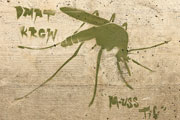Yellow Fever: Facts you need to know for safe African Safaris
We are often asked about yellow fever by people coming on African safaris. Here are all the facts you need to know about yellow fever to keep you safe on safari in Africa...
What Is Yellow Fever?
Yellow fever is a tropical disease transmitted by mosquitos. It is found in some areas of central and west Africa and South America and is usually not severe. A small proportion of cases can progress to severe disease and death.
Yellow fever vaccination (and non-drug measures) are essential to minimize the risk of yellow fever transmission. It is important to remember that some countries (and this includes South Africa and Botswana) require proof of yellow fever vaccination from people traveling from, or who passed through in transit, yellow fever-endemic countries within the past 6 months.
Most countries visited on African Budget Safaris are not yellow fever endemic (like South Africa, Namibia, Botswana, Mozambique, Malawi and Zimbabwe). The areas visited by African Budget Safaris that do require vaccination and precautions are the western half of Kenya, Uganda, Rwanda and Ethiopia. Those that may require vaccination are the eastern of half of Kenya, Tanzania, and some parts of Zambia.
Check what's needed by all the countries you'll be visiting, well in advance of your trip! Also, if you have any underlying medical conditions, check with your doctor as to the safety of visiting a yellow fever area and vaccination.
Risk to Travellers
According to the CDC (Centres for Disease Control and Prevention, USA), during the period between 1970 and 2013, only 10 cases of yellow fever were reported in unvaccinated travelers from the USA and Europe. Five of these were from travelers to West Africa, and the other five to South America. There has only been one, non-fatal, case reported in a vaccinated traveler.
The risk of yellow fever depends on a number of factors, including vaccination status, areas visited, length of stay, and season.
Transmission of Yellow Fever
 Aedes aegypti Mosquito by US Dept of Agriculture
Aedes aegypti Mosquito by US Dept of Agriculture
Yellow Fever is transmitted by mosquitos and has two hosts – primates and humans. It goes through three cycles:
Jungle Cycle: transmitted from primate (monkey) to mosquito and then to humans in the forested areas
Savannah Cycle: transmission from mosquito to human in jungle border areas, or human to human (via mosquito)
Urban Cycle: transmission between humans (via mosquito) in urban areas
 Colobus Monkey by Rod Waddington
Colobus Monkey by Rod Waddington
Yellow Fever Symptoms
Initially, yellow fever presents as a flu-like illness – fever, chills, body pains, headache, nausea and/or vomiting. These initial symptoms are similar to malaria, so if you’ve been into endemic areas of either (or both), be sure to inform your doctor immediately, should you show any symptoms.
Most patients get better with symptomatic treatment, but some people (about 15%) – after a brief remission – progress to the more severe form. This form presents with jaundice (thus the name), bleeding and eventually shock and organ failure. Medical intervention is essential.
Yellow Fever Countries & Areas
 CDC Yellow Fever Vaccine Map Africa
CDC Yellow Fever Vaccine Map Africa
Yellow fever is endemic in a large area of South America and across central and western Africa, and some parts of East Africa (see the CDC map, above). The areas visited by African Budget Safaris that require vaccination and precautions are the western half of Kenya, Uganda, Rwanda and Ethiopia.
Lower risk areas that may require vaccination are the eastern half of Kenya, Tanzania, and some parts of Zambia.
Important: Certification Needed For Travel
It is important to remember that some countries (and this includes South Africa and Botswana) require proof of yellow fever vaccination from people traveling from, or who passed through in transit, yellow fever-endemic countries within the past 6 months.
Again, check the map – if you’re stopping off in, for example, Ghana or Brazil, on your way to South Africa, you’ll need proof of vaccination to be allowed in. Check all countries (Africa, above; South America, below) you’ll be visiting or transiting (or have transited within the past six months) well in advance of traveling, to allow time for vaccination.
Yellow fever-declared countries in Africa: Angola, Benin, Burkina Faso, Burundi, Cameroon, Central African Republic, Chad, Democratic Republic of Congo, Republic of the Congo, Cote d’Ivoire (Ivory Coast), Equatorial Guinea, Ethiopia, Gabon, Gambia, Ghana, Guinea, Guinea-Bissau, Kenya, Liberia, Mali, Mauritania, Niger, Nigeria, Rwanda, Sao Tome Principe, Senegal, Sierra Leone, Somalia, Sudan, Tanzania, Togo, Uganda, Zambia
 CDC Yellow Fever Vaccine Map South America
CDC Yellow Fever Vaccine Map South America
Treatment
There is no specific treatment for yellow fever, only symptomatic and supportive treatment.
Preventing Yellow Fever
Non-drug measures
 Mosquito Net by missy
Mosquito Net by missy
The most important preventative measure is to avoid being bitten by mosquitoes in yellow fever-endemic areas. Following a number of simple steps can minimize your exposure to mozzies:
- Sleep under a mosquito net
- Cover up between dusk and dawn (long sleeves, long pants)
- Treat clothing with permethrin
- Use insect repellents on the skin
Yellow Fever Vaccination
 Vaccine for Travel in Africa by US Army Corps of Engineers
Vaccine for Travel in Africa by US Army Corps of Engineers
Yellow fever vaccination is also important and a requirement to enter countries in which yellow fever is present. It is important to remember, as stated above, that some countries (and this includes South Africa and Botswana) require proof of yellow fever vaccination from people traveling from, or who passed through in transit, yellow fever-endemic countries within the past six months.
The vaccine is a once-off injection that can be obtained from your local travel clinic. Immunity is conferred in most people by 10 days after vaccination, so be sure to get it well in advance of travel. Immunity lasts at least 10 years, if not life-long.
While some countries are changing their yellow fever vaccination requirement from needing a 10-year booster to no longer needing a booster, others aren’t. Check the requirements for the countries you’ll be visiting to confirm.
Contraindications to Vaccination
There are a number of situations where vaccination for yellow fever is not advised. If the vaccine is contraindicated, it is wise not to enter a yellow fever endemic area. If travel is unavoidable, a medical waiver needs to be obtained.
Some of the conditions in which the vaccine is contraindicated include:
- Infants younger than 6 months
- Previous hypersensitivity to the vaccine, or its components ( this includes people with egg allergy)
- Altered immune status (e.g. thymus disorder; HIV, if CD4 < 200; people on immunosuppressant drugs, e.g. post-transplant)
Precautions
Young Infants (6- 8 months old)
While the vaccine is contraindicated in infants under 6 months old, those between 6 and 8 months old should be vaccinated with caution – after weighing up potential adverse effects/risks with potential benefits – and only if travel is unavoidable.
Older Travellers
People over 60 years of age are also at higher risk for adverse reactions to the vaccine. Again, if travel to yellow fever areas is unavoidable, the decision to vaccinate must be made after weighing up the risks and benefits.
Others
A number of other conditions require careful thought and weighing up of risks and benefits with your medical practitioner before vaccination or request for a medical waiver. These include
- HIV Infection (CD4 > 200)
- Pregnancy
- Breastfeeding
- Chronic conditions such as renal or hepatic disease
Stay Safe on Safari in Africa
Now that you have the facts you need about yellow fever, you are one step closer to a healthy and safe African Safari. Should you be unsure of any of the requirements regarding yellow fever (or anything else), contact one of our ABS consultants, and we'll be happy to help.
For medical advice, and your specific health risks according to your medical history - discuss with your doctor and local travel clinic.
Here's to a safe and healthy safari in Africa!
If you liked this post, these trips cover similar ground…
- Full Day Addo Elephant Park Big 5 Safari
- 5 Day Addo Park & Amakhala Big 5 Safari
- 5 Day Addo Park & Kariega Big 5 Safari
- 3 Day Big 5 Cape Town Safari to Aquila Private Game Reserve
- 2 Day Cape Town Safari - Big 5 Budget Tour
- 2 Day Pilanesberg Safari to Kwa Maritane Bush Lodge
- 3 Day Pilanesberg Big 5 Safari - Ivory Tree Game Lodge
- 4 Day Pilanesberg Safari to Kwa Maritane Bush Lodge
- Pilanesberg Safari Day Tour in South Africa



 Briony is a qualified pharmacist, published author and travel blogger living in Cape Town. She writes her own blog about travel, the arts, music and the good things in life, with a focus on accessibility. She likes watching the world go by, and sometimes it makes her nose twitchy, but mostly it provides golden nuggets with which to light up the page.
Briony is a qualified pharmacist, published author and travel blogger living in Cape Town. She writes her own blog about travel, the arts, music and the good things in life, with a focus on accessibility. She likes watching the world go by, and sometimes it makes her nose twitchy, but mostly it provides golden nuggets with which to light up the page.











